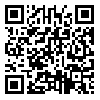BibTeX | RIS | EndNote | Medlars | ProCite | Reference Manager | RefWorks
Send citation to:
URL: http://jccnc.iums.ac.ir/article-1-98-en.html
2- Department of Biostatistics, School of Public Health, Iran University of Medical Sciences, Tehran, Iran.
Background: One of the important challenges to health service policy makers is conservation of human resources. Shortage of human resources in health and care sector damages quality of services. Another problem of organizations is low organizational commitment, which may result in poor performance and high costs reflecting improper use of human resources. Committed employees set the scene for growth and development of the organization. Talent management is a new management method, which have dramatically changed human capital management and overcome the weaknesses and deficits of traditional approaches. Considering the critical role of midwives in the health care of mothers and infants, devotion of high organizational commitment by midwives is important. Therefore, the present research aimed at determining the relationship between talent management and organizational commitment in midwives working in hospitals affiliated to Iran University of Medical Sciences.
Methods: This research was a descriptive cross-sectional study. The statistical population comprised midwives working in hospitals affiliated to Iran University of Medical Sciences. Information was collected using Arabpour and Nikpour’s talent management researcher-made questionnaire and Allen-Meyer's organizational commitment questionnaire (24 item). Validity of the questionnaires was approved using the content validity test and their reliability was confirmed using the Crobach α coefficient method. The calculated Cronbach α coefficients for talent management and organizational commitment were 0.82 and 0.80, respectively. The obtained data were analyzed by SPSS 16.
Results: Talent management score was higher than average condition with a mean score of 3.05. Dimensions of talent development (3.37) and talent conservation (2.73) had the highest and lowest mean scores, respectively. The score of organizational commitment of midwives was 101, and the affective commitment dimension had the highest mean value of 35 among others. The Pearson correlation coefficient revealed a statistically significant relationship between talent management (and its dimensions) and organizational commitment (and its dimensions) (P<0.001, r=0.48).
Conclusion: Considering the positive effects of high level of commitment on conservation of employees, hospital managers can improve their commitment using new management methods to encourage talents and capabilities of their human resources.
Received: 2016/11/5 | Accepted: 2016/12/25 | Published: 2016/12/25
| Rights and permissions | |
 |
This work is licensed under a Creative Commons Attribution-NonCommercial 4.0 International License. |





